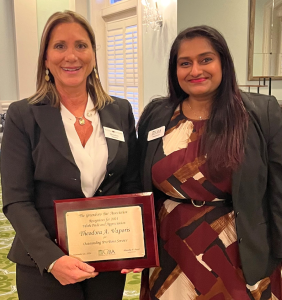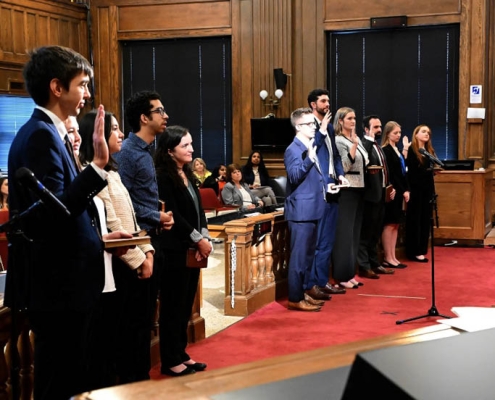
Camille Stell is President and CEO of Lawyers Mutual Consulting & Services. Continue this conversation by contacting Camille at camille@lawyersmutualnc.com
In today’s interconnected and diverse world, cultural competency has emerged as a vital skill for professionals in every field, including law. For small law firms, often embedded in the fabric of their communities, cultural competency is not just a beneficial attribute—it is a necessity. By fostering a deeper understanding of cultural differences, small law firms can better serve their clients, improve their reputation, and contribute positively to the community they operate in.
This article explores the importance of cultural competency for small law firms, practical ways to cultivate it, and the profound benefits it brings to the firm, its employees, and the community at large.
Meeting Diverse Client Needs
Small law firms typically deal with deeply personal legal matters such as criminal defense, family law, estate planning, and small business ownership. These areas often intersect with an individual’s cultural background, values, and traditions. For instance:
- In family law, differing cultural perspectives on marriage, divorce, and child custody may influence a client’s decisions and priorities.
- Estate planning may involve navigating cultural beliefs about inheritance or familial obligations.
- Small business clients from immigrant communities may face unique challenges tied to language barriers, unfamiliar regulations, or cultural expectations.
Without cultural competency, lawyers and staff risk misunderstanding their clients’ needs, offering ineffective counsel, or inadvertently alienating the very people they aim to serve.
Lawyers in small communities often become trusted advisors, and their reputation can make or break their practice. Cultural competency fosters trust and respect by demonstrating a genuine commitment to understanding and valuing clients’ diverse perspectives. Clients who feel heard and respected are more likely to refer others and return for future legal needs, strengthening the firm’s standing in the community.
Addressing Implicit Bias
Implicit biases—unconscious attitudes or stereotypes that affect decision-making—can hinder a lawyer’s ability to provide impartial and effective representation. Cultural competency involves recognizing and mitigating these biases, ensuring that every client receives fair and equitable treatment.
How to Cultivate Cultural Competency
Developing cultural competency is a continuous process that involves education, self-awareness, and active engagement. Here are some practical steps small law firms can take:
1. Training and Education
Invest in regular training for all staff members, including attorneys, paralegals, and support staff. Topics should include:
- Recognizing and addressing implicit bias.
- Understanding cultural norms and values that may influence legal decisions.
- Effective communication strategies for working with clients from diverse backgrounds.
Many of our bar associations are offering continuing legal education programs on topics such as addressing implicit biases. The Center for Creative Leadership located in Greensboro offers excellent courses in topics of diversity and inclusion, creating leadership development programs, and other solutions that will help your firm cultivate cultural competency.
2. Hiring and Representation
A diverse team brings varied perspectives and experiences, enhancing the firm’s ability to understand and serve clients from different backgrounds. When possible, recruit employees who reflect the diversity of your community. Representation within the firm can also make clients feel more comfortable and understood.
3. Active Listening
Active listening is a cornerstone of cultural competency. Encourage lawyers and staff to:
- Avoid assumptions about a client’s values or priorities.
- Ask open-ended questions to clarify understanding.
- Pay attention to non-verbal cues that may signal discomfort or disagreement.
4. Language Access
Language barriers can be a significant obstacle in legal matters. Small law firms can address this by:
- Hiring bilingual staff or partnering with professional interpreters.
- Providing key documents in multiple languages.
- Utilizing translation technology when necessary.
5. Community Engagement
Building relationships within the community helps law firms stay attuned to the cultural dynamics that affect their clients. Attend local events, join cultural organizations, and participate in community discussions. These efforts demonstrate a commitment to inclusivity and provide opportunities to learn directly from community members.
6. Regular Self-Assessment
Cultural competency is an evolving skill. Encourage ongoing reflection by:
- Soliciting feedback from clients and employees about the firm’s cultural sensitivity.
- Reviewing cases to identify areas where cultural understanding played a critical role—or where it fell short.
- Setting measurable goals for improving cultural competency.
The Benefits of Cultural Competency
Culturally competent lawyers are better equipped to identify and address the unique needs of their clients, leading to more favorable outcomes. For example:
- A culturally sensitive approach to family law might result in custody arrangements that respect a family’s traditions.
- In estate planning, understanding a client’s cultural values can help draft documents that honor their wishes.
When clients feel their values are respected, they are more likely to trust and follow their lawyer’s advice.
Enhanced Reputation and Client Retention
Clients who feel respected and understood are more likely to recommend the firm to others. Word-of-mouth referrals are particularly valuable for small law firms, where personal connections often drive business. By demonstrating cultural competency, a firm can build a loyal client base and establish itself as a trusted community partner.
Increased Employee Satisfaction
Cultural competency doesn’t just benefit clients—it also creates a more inclusive and supportive work environment. Employees who feel valued and respected are more likely to be engaged, productive, and committed to the firm’s success. A culturally aware workplace can also attract top talent, further strengthening the firm.
Broader Community Impact
Small law firms play a vital role in the communities they serve. By prioritizing cultural competency, these firms can:
- Foster greater understanding and inclusivity within the community.
- Advocate for policies and practices that address systemic inequities.
- Serve as role models for other local businesses and organizations.
A culturally competent law firm becomes a beacon of fairness and justice, reinforcing the values that hold communities together.
Overcoming Challenges to Cultural Competency
While the benefits of cultural competency are clear, implementing it can be challenging. Small law firms often operate with limited resources and may feel overwhelmed by the prospect of adding another responsibility to their workload. However, even small, incremental changes can make a significant difference.
Finding Affordable Resources
Many organizations offer free or low-cost training programs, webinars, and toolkits on cultural competency. Diversity Lab is an online resource you may want to investigate. Also, you may be able to get CLE credit for bar programs while also enhancing your firm’s skills in this area. Local community groups may also be willing to partner with firms to provide insights and resources.
Balancing Cultural Awareness with Legal Requirements
Cultural considerations must sometimes be balanced against legal obligations. For example, a client’s cultural preference for informal agreements may not align with the legal requirement for formal documentation. In such cases, cultural competency involves respectfully explaining legal necessities while finding ways to honor the client’s values.
Conclusion: A Win-Win for Everyone
Cultural competency is not just a professional responsibility for small law firms—it is an opportunity to make a lasting positive impact. By investing in cultural awareness, law firms can provide better representation, build stronger relationships, and contribute to a more inclusive and equitable community.
For the firms themselves, cultural competency enhances their reputation, strengthens client loyalty, and fosters a supportive workplace culture. For employees, it provides a sense of pride and purpose, knowing their work aligns with principles of respect and justice. And for the community, culturally competent law firms serve as trusted allies, advocating for fairness and understanding in every legal matter.
In a world where diversity is both a reality and a strength, cultural competency is no longer optional—it is essential. Small law firms that embrace this principle will not only succeed but thrive, becoming indispensable pillars of the communities they serve.
Camille Stell is the President of Lawyers Mutual Consulting & Services and the co-author of the book, RESPECT – An Insight to Attorney Compensation Plans, 2nd edition is now available. Continue this conversation by contacting Camille at camille@lawyersmutualconsulting.com or 800.662.8843.















